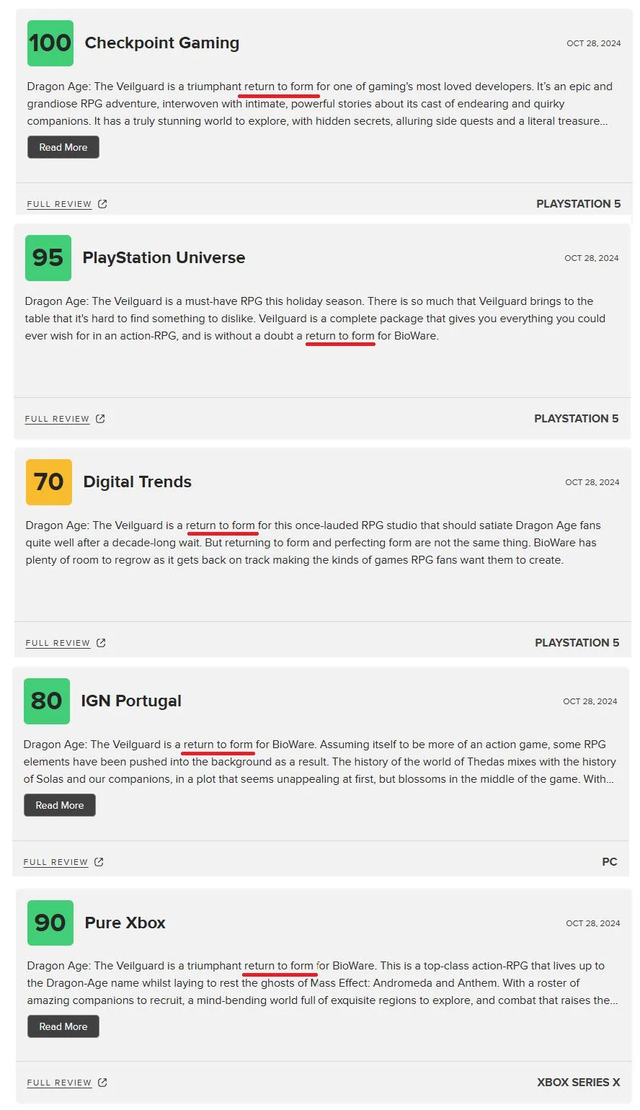
Drasglaf
- 0 Posts
- 100 Comments


What a strange way to look at it. Does Valve charge double than other store fronts, or did those other store fronts start charging half in an attempt to undercut Valve?
Also I find it strange how you mention things like publishing fees and people not liking games being released on other store fronts instead of Steam while you fail to write a single mention to Steam’s main competitor in those fronts: the Epic Games Store.
Is there a reason for these 2 points, or are they just a coincidence?
Knights of the Old Republic: D20 based RPG set in pre-BBY Star Wars universe. Excellent story and characterization, great gameplay and progression - I’ve replayed it at least six times. If you like Mass Effect at all you should enjoy this. The sequel is worthy but not the same gem that moved the genre, but a worthy title
The sequel has Sara Kestelman as Kreia, that alone makes it worth playing IMHO.


Since the remake released I have a new hobby: I’ve been watching people play it for the first time on Twitch. There are lots of (usually younger) people who know nothing of this game.
They all come expecting
spoiler
a cool, scary game (which it is, of course) and end up leaving with their hearts broken.
Quite entertaining to share those moments with them.


Abstract In the personal computer video game market, a digital rights management (DRM) technology called Denuvo has been used since 2014 to restrict software usage to legitimate buyers, thereby preventing piracy. Sometimes Denuvo DRM is bypassed or “cracked”, after which the video game can be pirated. I exploit the randomness with which Denuvo is cracked to estimate the effect Denuvo has on protecting revenue from piracy displacement. When Denuvo is cracked very early on, piracy leads to an estimated 20 percent fall in total revenue on average relative to an uncracked counterfactual, but that effect is weaker the longer it takes for Denuvo to be cracked. When Denuvo survives for at least 12 weeks, piracy leads to nearly zero total revenue loss on average. The results suggest that Denuvo does protect legitimate sales to an estimated mean of 15 percent of total revenue and median of 20 percent, but there is little justification to employ Denuvo long-term (i.e. for more than three months), especially given that Denuvo can have negative technical side effects and is generally disliked by users.
Section snippets Digital goods and digital rights management Digital goods are unique because anyone with access to the sequence of zeros and ones that constitute the good can replicate the good with no special know-how, compromising a developer’s control over supply. Furthermore, affordable and rapid internet speeds along with plentiful storage imply that additional units can be produced and distributed at practically zero cost by nearly anyone. Computer files are non-rivalrous and non-excludable goods. Consequently many developers rely on some form of DRM business decisions and effects The decision for publishers to use DRM on video games appears to depend on how rampant piracy is, whether DRM will survive for any meaningful period of time, and whether the developers have strong feelings against DRM. Video game publishers themselves have said that piracy is a concern, with the CEO of Ubisoft claiming that their piracy rates were above 90%, and furthermore than their DRM was “a success” in reducing piracy; but Ubisoft also mentioned that the online-only nature of their DRM was
Summary of Denuvo DRM “Denuvo Anti-Tamper” is a digital rights management technology that has been used prominently with PC video games since 2014. Its stated purpose is to prevent unauthorized distribution of software for a long enough period of time so as to protect early revenue from displacement. It works by assigning “a unique authentication ‘ticket’ to each copy of a game, a sort of license shaped by all sorts of factors like hardware ID. Because Denuvo integrates with a game’s code, you can’t just crack it Variables and data The probability that a particular game’s DRM gets cracked depends on how strongly cracking groups are focused on that particular game, so it is worth asking: what factors would make cracking groups target a particular game, and what factors can one use to predict how long DRM will last? It is hypothesized here that one is better able to predict if and how quickly a game is cracked depending on the following factors. (Subsequent tests will argue that none of the factors actually do help in
Effect of being cracked In this section, I examine how the availability of a cracked copy of a game affects a game’s revenue over time. The timing of the crack will be critical: revenue is highest close to the release date, and therefore a crack that appears close to the release date has a disproportionately large effect on revenue. On the other hand, a crack that appears well in to the future has little effect. This result has some precedent in other studies, for example Ma et al. [58] find that the pre-release
Predicting a crack I do the same tests using Metacritic scores instead of OpenCritic scores. Metacritic’s scoring system is opaque, sometimes omits reviews from notable publications with no explanation, and has no scores at all for many games, which is why it was not chosen as the main variable. That said, it can serve as a robustness check as a measurement of quality. As shown in Tables A.3, A.4, and A.5, the results are typically worse for regressions using Metacritic scores: the -values are considerably
Conclusion As with sales of digital music, movies, and e-books, sales of a certain type of video game (specifically, those with relatively small network effects) also appears to be prone to displacement from piracy. There appears to be little difference between the kinds of games that are cracked quickly and those that are not. When DRM survives the efforts of cracking groups, it appears to protect such video game sales from displacement of piracy. The extent to which DRM protects legitimate sales depends CRediT authorship contribution statement William M. Volckmann II: Writing – review & editing, Writing – original draft, Project administration, Methodology, Investigation, Formal analysis, Data curation, Conceptualization. Declaration of competing interest The authors declare that they have no known competing financial interests or personal relationships that could have appeared to influence the work reported in this paper.
Acknowledgments I would like to thank Erich Muehlegger, Jacob Anderson, and Tomáš Fedor for facilitating data access and collection for this project.


Highlights
• Denuvo DRM protects total revenue from piracy by a mean of 15% and a median of 20%.
• Piracy causes mean total revenue to decrease by 20% when Denuvo is cracked quickly.
• Piracy causes zero mean total revenue loss when Denuvo survives for 12 weeks or more.
• The characteristics of a game cannot explain its likelihood of being cracked.


but unfortunately the research is behind a paywall.
Do you mean from here?
Edit: I replied to myself with the full article, just in case. I have to go and can’t read it at the moment.
- Final Fantasy 7 Rebirth
- Astro Bot
- The Legend of Zelda: Echoes of Wisdom
- Animal Well
- Black Myth: Wukong
- Like a Dragon: Infinite Wealth
Dark horses
Dragon’s Dogma 2
Helldivers 2
Balatro
The Last of Us Part 2 Remastered
Hades 2
Upcoming
Dragon Age: The Veilguard
STALKER 2: Heart of Chornobyl
Metaphor: ReFantazio
The Plucky Squire
Assassin’s Creed Shadows
Life Is Strange: Double Exposure
Silent Hill 2 and Metal Gear Solid Delta
Call of Duty: Black Ops 6



Anbernic recently released the RG 34XX. It doesn’t have SteamOS, but it’s still Linux.